Under Texas HB 1416, Accelerated Learning Committees are no longer required. But, some school may still choose to make use of them. An accelerated learning committee includes staff members, and the student and parent or guardian if possible. Their job is to meet to create an educational plan for a student, and then monitor their progress along the way.
How can you manage accelerated learning committees, and effectively provide support for a student? One strategy could be using Team Agendas to set up the accelerated learning committee (ALC).
Setting Up an Accelerated Learning Committee
Using the tool Team Agendas, a staff member or admin user would log into their account. Next they would select the ‘My Teams’ page to create a new team, or in this case, a new ALC. On the My Teams page they would select the ‘Create Team’ button.
This will take the user to a page where they can enter all of the team information. They can name it whatever would make sense in the school, for the student they are meeting with, in this example it is called Skyler’s Math ALC.
There is a tab for staff and students where the user can add staff members and students to the team by checking the box next to their name, as you can see in the image below. Likely, in an ALC only one student would be added.
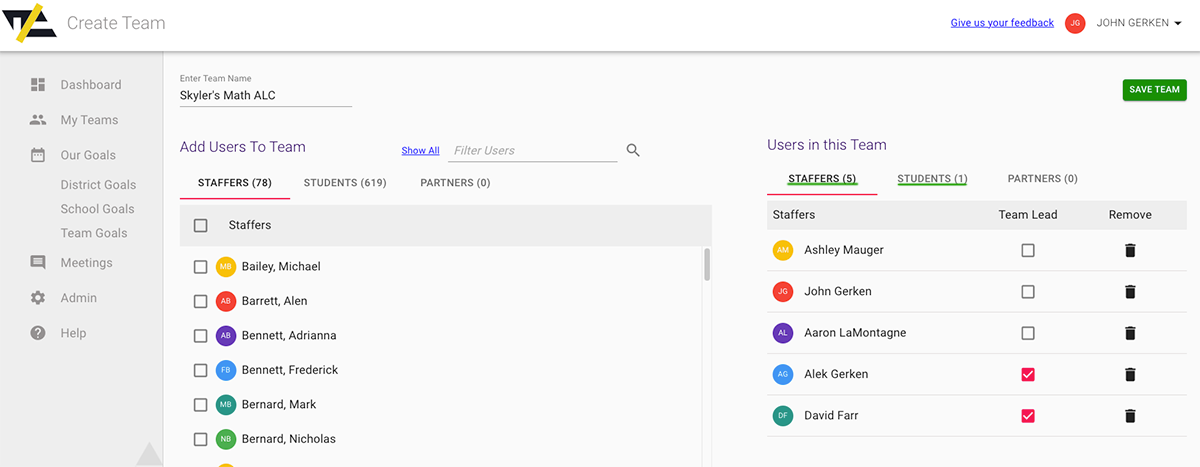
Once the ALC has been set up with the student and the staff members needed, the user would save this new team. Later they could add team norms, and further edit the team if needed.
But now, this committee will want to meet to discuss the student’s educational plan, and again, monitor the students progress along the way.
First, one thing that would be done is setting up a goal for the student. Then, meetings and tasks could be scheduled to help the student meet those goals. So next the user could go to the Team Goals page, which could coincide to that student’s Education Plan for the ALC.
Creating Goals for a Student’s Education Plan
On the Team Goals page, the user would choose the ‘Create a Goal’ button, which can be seen circled on the Team Goals page image below.
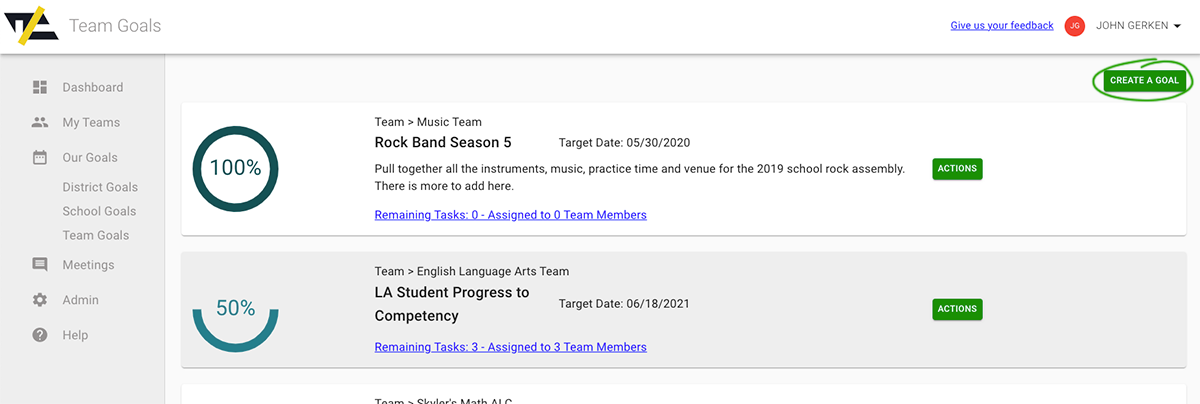
Now, as seen in the image below, the user can set up the goal, giving it a title, target date, and assigned team. The assigned team would be the ALC that was just created. In this example the goal is named Skyler’s Education Plan Goal. Once the other information is added, the goal would be saved.
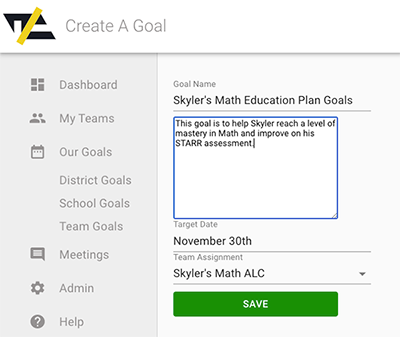
The user can then go back to the Team Goal page and select the Remaining Tasks link, which will allow them to add tasks to outline the goal.
You can see an example of the page to add tasks in the image below. Checking off all of these tasks will bring this goal to 100%, thus meeting the goal.
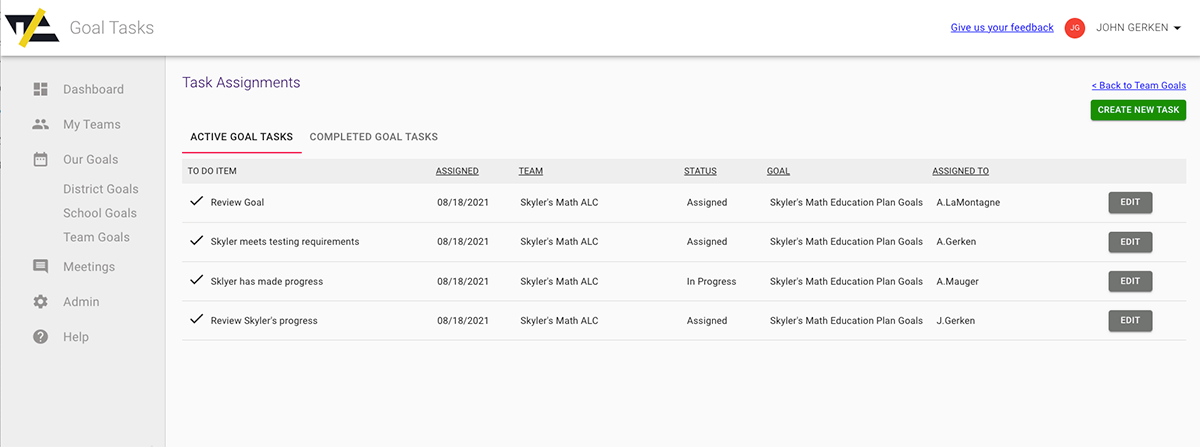
A user would select the ‘Create New Task’ button to add a new task. Because this goal is connected to Skyler’s ALC, the only available staff members that can be assigned a task for this goal are members of the ALC. In addition, if there is already a meeting set up for this ALC, that meeting could be selected in the dropdown to add the task to the meeting. This is a great way to keep things on track with a student’s education plan. See an example of the Assign Task page below.
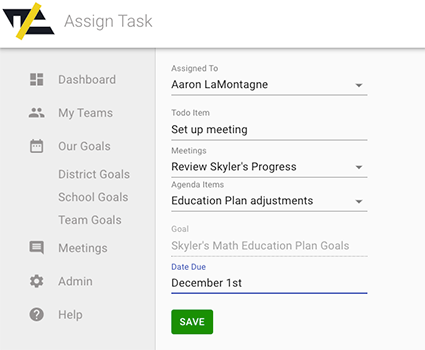
If other things come up along the way that will delay the Skyler’s goal, an additional task can be added before reaching 100%. For example, let’s say Skyler doesn’t make progress. A user could add the task ‘Set up meeting with superintendent’ to discuss what to do next for Skyler.
As more tasks are added, it’s important to note that this will mean there are more tasks to check off before Skyler get to 100%, reaching his goal. See an example of what the goal looks like on the Team Goals page as tasks begin to be completed.

Meetings are a critical aspect of Accelerated Learning Committees. These meetings allow educators to create a students education plan, monitor the students progress, and find additional ways to offer the student support. The next section will discuss creating and managing meetings for ALCs.
Create and Manage Accelerated Learning Committee Meetings
To create a meeting in Team Agendas, a user would select Meetings from the menu, and then select the ‘Create New Meeting’ button. This would take them to a page where they could enter all of the meeting details, including when and where the meeting will take place, and a brief description of what it’s about. The meeting would be assigned to the ALC team. If this were going to be a virtual ALC meeting, the user could add a Zoom link here as well. See an example of this in the image below.
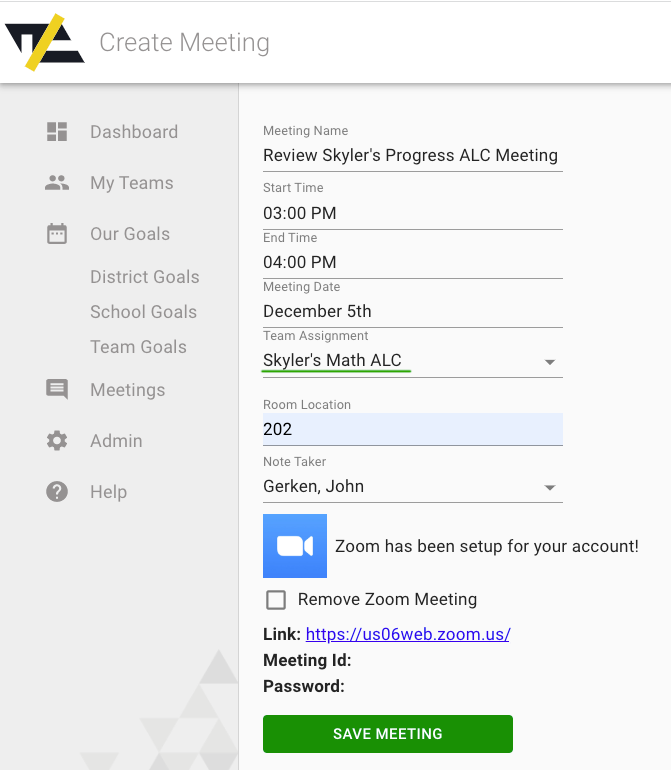
After saving the meeting, the user could now create the team agenda. This will help each ALC member know what is to be discussed in the meeting. Users can also take notes for each item of the agenda.
To create an agenda, the user would go to the ALC meeting on the Meetings page, then select ‘Actions’ then ‘Agenda’, as you see underlined in the image below.

This will take the user to the Agenda page. On this page they can add agenda items by selecting the ‘Agenda Actions’ button, then ‘Add Agenda Item’. Agenda items which include a title, description, a type such as ‘Q&A’ (these can be custom set for each school), facilitator, and consideration time. See an example of what creating an agenda item looks like in the image below.
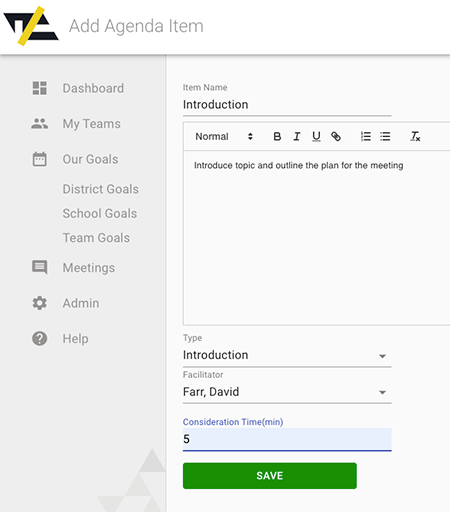
As each item is saved, they create the complete agenda. On the meeting’s agenda page, each item can be dragged and dropped to adjust the order. In addition, when the user selects ‘Agenda Actions’ and then ‘Post Agenda’ this will send an email notification out to each staff member in the ALC. This will alert them that the agenda is up and available to view. It will also help them follow along with the agenda during the ALC meeting.
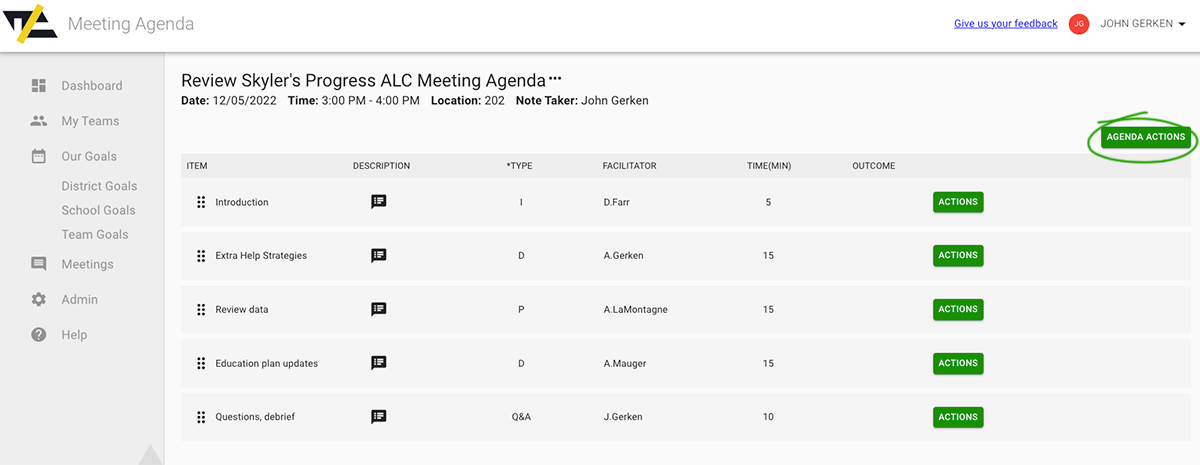
Committee members can also add notes to each agenda item, and assign tasks resulting from the discussion, right within the agenda. To do this they would select ‘Actions’ next to the agenda item name, and then ‘Take Notes’. Here is an example of what the Take Notes page looks like below. The button to add a task is circled.
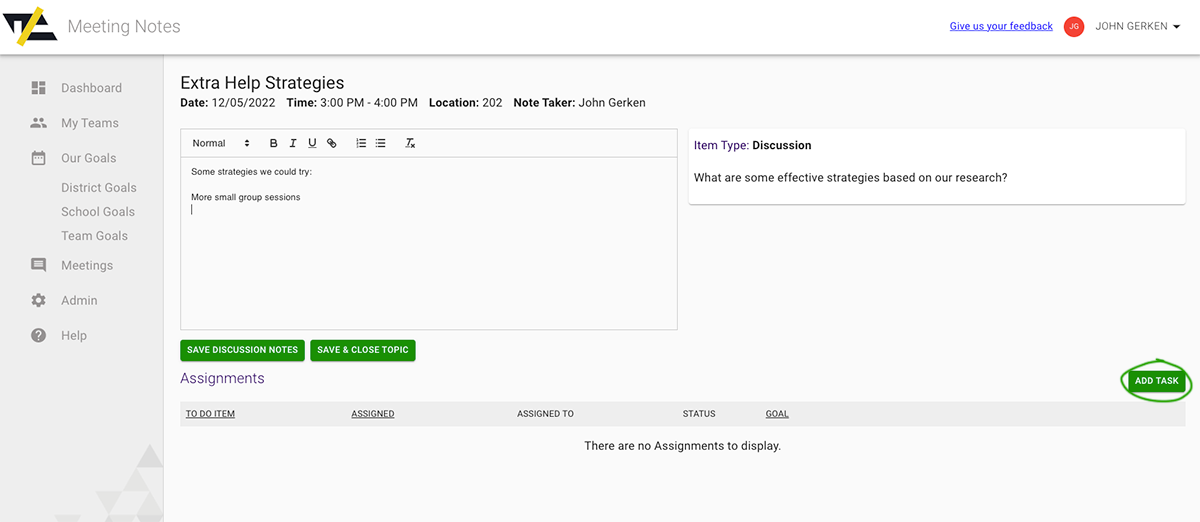
These tools can help ALCs document a student’s progress, and organize their own processes. After a meeting, as committee members work on assign tasks, they can take notes to document what they are doing.
Documenting Assigned ALC Tasks
To work on assigned tasks, logged in to their Team Agendas account, a user could see their assigned tasks right from the Dashboard. In the My Assigned Tasks box you see below, the user would select ‘Actions’ and then ‘Add Notes’.
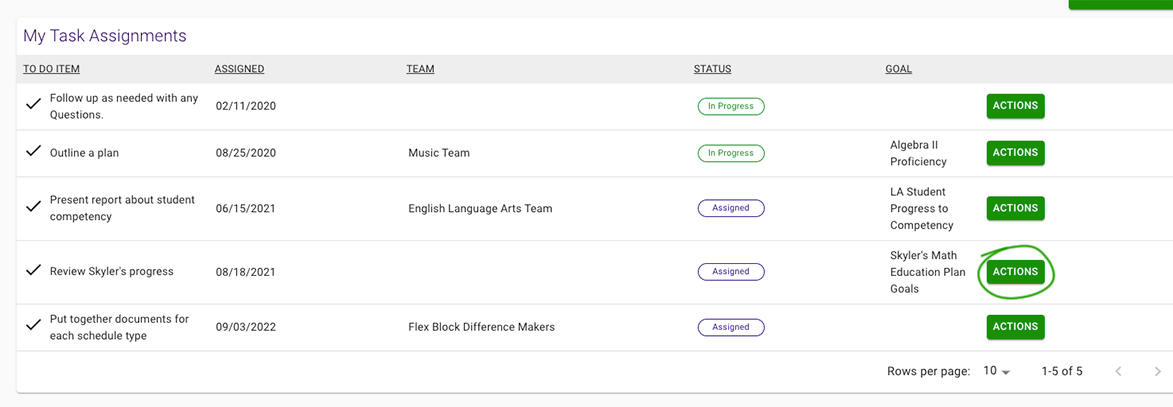
On the Take Notes page for the assigned task, a user would add and save notes that would be saved with their name and the date posted. This would help both them, and the ALC stay organized and up-to-date.
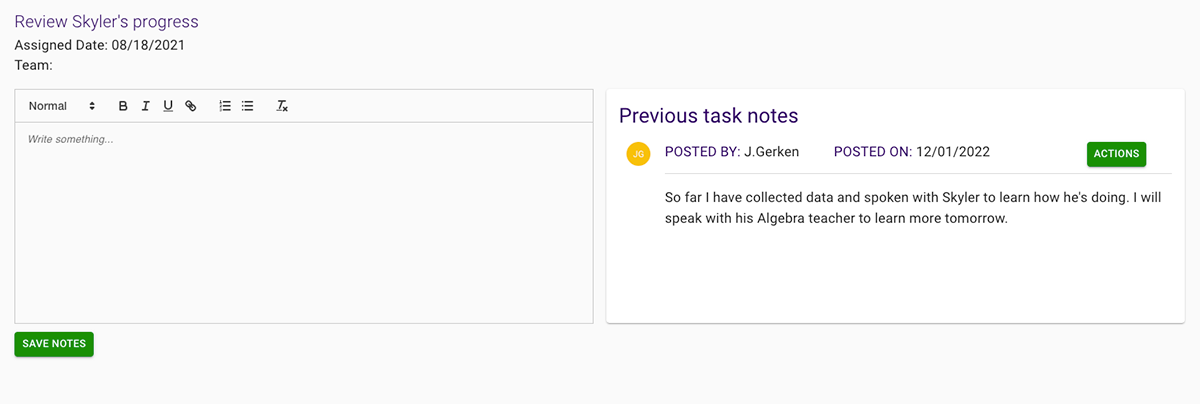
Once the user has completed the task, they can check it off by selecting the check mark next to the task back in the ‘My Task Assignments’ box. As this task is connected to Skyler’s ALC goal, this will check off the goal task and bring the goal closer to completion.
There are so many features in Team Agendas that haven’t been covered in this post, and various ways it could work in a school district, from managing ALCs to department teams, PLC and district-level meetings. To see a live demonstration, schedule a free demo today!
Can Enriching Students and Enriching Teachers Work Together?
The tools Enriching Students® and Team Agendas can both help Texas School Districts manage various processes of House Bill 1416, including managing time, scheduling students, and tracking time for accelerated instruction. But, they can effectively work together a well.
The same students and staff members can be imported into both tools. For example, below is a snapshot of the Student Profile in Enriching Students®, which will show a student’s grades (if imported) as well as where they have been scheduling during flex, their attendance, and teacher comments.
A Student’s Profile can help inform an ALC, PLC, or other staff team about a student’s needs, and how those needs are being met.
Within Enriching Students®, an ALC member could then schedule a student for accelerated instruction sessions in the subject areas they need it.
Check out our Texas House Bill 1416 guide, and to learn more about Enriching Students® and Team Agendas, click the button below to schedule a demo.





